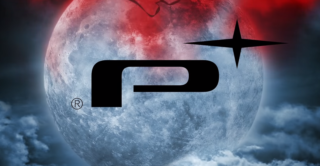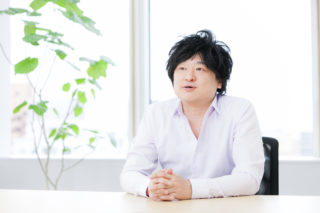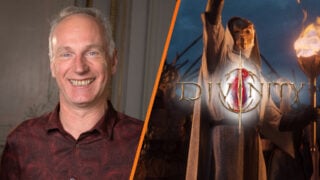Platinum fights for its future
Atsushi Inaba on the Bayonetta studio’s mission to control its destiny

Step into the lobby of Platinum Games’ Osaka HQ and it’s impossible not to be impressed by the developer’s incredible, vibrant portfolio of original games.
Sprawled across its office carpet are numerous critically-lauded IPs created in its first decade of operation, from the painfully stylish Mad World and Vanquish, to the excellent-but-overlooked Wonderful 101 and its iconic action game Bayonetta.
[UPDATE: VGC’s Astral Chain review has been published, awarding the game a score of 5/5]
In all, Platinum Games has produced 15 games in ten years, and it has at least five more in development. If there’s an Osaka equivalent of Carpetright, it can look forward to some healthy business from the city’s premier independent studio.
And yet, this action game powerhouse doesn’t have full control of a single polyester fibre on that floor.
During the company’s first ten years, its reliance on third-party partnerships left all of its games in the ownership of other companies, and now it has limited options for the future.
Even Bayonetta, the character action series it’s most famous for, is still the subject of complex negotiations between rights holder Sega, Platinum’s team and new publisher Nintendo.
It’s really not surprising then, especially following the cancellation of blockbuster Xbox One exclusive Scalebound in 2017, that Platinum is determined to break away from its reliance on partnerships and become the master of its own destiny.
Shuffling VGC into one of the company’s plush meeting rooms, studio head Atsushi Inaba expresses a determination to break the cycle.
Platinum is busy creating two new independent IPs owned entirely by the studio, neither of which have been announced. The company is also planning to move into self-publishing, Inaba said.
These two decisions combined should finally give Platinum Games the freedom to choose entirely its own directions, including making sequels. And maybe even pay for that new carpet.

There’s no clear-cut methodology for building a new IP. Probably if you’re going to look at the core differences between people who try to build a new IP for the sake of it, versus people who are building a game because they love it, it’s really the latter that is going to have a higher chance of success. Because it’s the passion that organically makes you want to work harder. It’s that drive: it’s the thing that generates better, more interesting ideas most of the time.
So if you are going to build a new IP, the one thing you should focus on is something that you feel really passionate about. That may sound like a cliché, but that is kind of our studio’s mantra. We say, ‘we’re going to make new, original games and we don’t care what the consequences are’. We’re not going to let other people tell us that what we’re doing isn’t good, or unpopular, or not the current trend… if we love it and we feel passionate about it, then damn the consequences! We’re going to go all in with our hearts.
In the West, it feels as if many large independent game creators are forever living on a knife edge: always a single flop away from financial ruin. However, over the past decade Platinum seems to have gone from strength to strength while still taking risks on new, original games. What’s your secret?
One of the things you see from Western studios of a similar size to us (200 – 300 people) is that the whole studio is put on to one project. Or maybe there are multiple projects, but one large, key project is funding most of the studio. And the second that goes away, then already the dominoes begin falling.
For us, one could argue that it’s not a great thing but we have a lot of different creators internally that want to create a lot of different game ideas. And so what organically has happened for us is that we don’t just do one game, or two games: we do several games at once. What this means is that maybe one game ends up being critically acclaimed but didn’t work out from a business perspective. Meanwhile, maybe another game ends up working out from a business perspective but didn’t put our best foot forward.
We have a lot of different variation in our portfolio as a studio but what generally has happened is that there have been one or two good games that have been able to financially absorb any of the losses for other titles which underperformed. Of course, thinking of what we would be able to create if we had all of our developers working on one, single IP, sure it would be an amazing thing – and I’m not 100% opposed to that – but usually the way we have grown as a studio has been by having enough, strong creators working across a variety of different games.
To add to that, I’m always in a position where my nerves are on edge, because I’m not just juggling two balls, but about eight balls! And if one of those balls drops, then the other ones have a tendency to drop as well. So all teams need to be firing on all cylinders and that within itself is a challenge. It’s a different type of nervous energy that you get when you have such a varied portfolio, versus being able to work on one, big game.

It’s only April and already you’ve made one significant announcement in Astral Chain. How exciting is 2019 going to be for Platinum Games?
2019 will be an incredibly important year for us. Without speaking directly to the number of titles we may or may not announce, I can say it’s going to be a year of some major new approaches, new challenges and new methods for us. Basically, we’re building a new foundation that in later years will pay dividends. For us, new challenges are going to be very important.
Are these new approaches designed to address any specific challenges the company has faced in the past?
It’s not really informed by any previous problems that have occurred. To speak more specifically about what these new challenges are for us, you can break it down to two categories. One is game design perspective: Right now we’re in the middle of designing something that has never been done before. I know a lot of people say that, but the game we’re working on truly is unlike anything else. Even for our varied history of veteran game developers, this is something that has never been designed before. So from a game design perspective, we’re very excited right now.
The other challenge for us is a business model challenge: up until now we’ve relied on publisher funds to be able to make new titles. Obviously we’ve been in the press recently talking about self-publishing and what-not and that is going to be a new challenge for us as a company.
“2019 will be an incredibly important year for us. Without speaking directly to the number of titles we may or may not announce, I can say it’s going to be a year of some major new approaches, new challenges and new methods for us.”
Meanwhile Astral Chain is more of what we expect from Platinum: a character action game. What ambitions do you have for that title?
For Astral Chain there are two things that we really wanted to focus on. We’re used to doing single-player character action games, but in this particular game you as the player also control a monster at the same time, so you have to split focus between control of two characters. That is really an evolution of some of the action games that we’ve built in the past.

To get from where this project initially started several years ago to now, we have had to face many different pitfalls and challenges along the way. But now it’s finally at the point where it’s a very unique, original experience and exactly what we wanted it to be with the core idea of ‘Synergetic Action’. Separate from that, we really wanted this project to push Taura-san as one of our new, up-and-coming directors and get him recognition. Because Platinum isn’t a studio with just one or two directors:it needs to be a studio of multiple directors who all have their own flavour.
The dual-character gameplay reminds us of the cancelled Scalebound. Was there any influence transferred from that project?
I can’t go in to detail about how the different gameplay systems of Astral Chain and Scalebound work, but they’re both very different. Any feeling of similarity between the two projects is not true. It’s all in your imagination! (laughs)
Platinum Games is now over a decade old, with many cherished game franchises. Is it difficult to manage the expectation of fans in that regard, and satisfy both the demand for sequels and your own urge to create something new?
It’s not like we’re opposed to sequels, it’s just that quite frankly there needs to be a business case that justifies a sequel. Obviously we’ve already announced Bayonetta 3, so we’re willing to go deep in to sequel land if we need to! But again, in the games industry and with game sales in general you need a lot of luck and good timing. You need to have financials on your side in order to be able to justify sequels, so it’s a balance. That being said, if there are games where all of those factors fit together in the right way, then we would not say no to a sequel.
And IP ownership must make the situation even more complicated, with Sega owning some of your older franchises?
Yeah, it’s absolutely the truth that there are cases where you want to do a sequel but if you don’t own the IP, you can’t do it. It’s that simple, and quite frankly in the case of Bayonetta it took a lot of time and energy to get it to the point where sequels could be made. It wasn’t as simple as picking up the phone and asking, ‘hey, can we do this?’ There were a lot of pieces that needed to fall in to place and a lot of negotiating that had to occur.
That’s a pain. That’s a hassle. For us as creators, we want to get to the point where self-publishing allows us to own our IP and do what we want with it, including making sequels. So the faster we can have that freedom, the better if will be for all the creators here.
We can’t help but wonder if your experience with Scalebound – working for years on a project and having it cancelled by the publisher – has strongly influenced your current philosophy?
No, I wouldn’t say our experience with Scalebound influenced us to go towards self-publishing. Quite frankly, the reality is that we’ve had plenty of titles cancelled in the past: that’s part and parcel of what comes with making video games.
Watching fans getting angry at Microsoft over the cancellation wasn’t easy for us to watch. Because the reality is, when any game in development can’t get released it’s because both sides failed. I think there are areas where we could’ve done better and I’m sure there are areas that Microsoft as a publishing partner wish that they could’ve done better. Because nobody wants a game to be cancelled.

At the bare minimum, it’s unique for us as a title in so much as we feel that we didn’t do all of the things that we needed to do as a developer. There were a lot of painful lessons, but that helped us grow as a studio. We obviously can’t go in to details about it, because there are rules of engagement as a developer. We want to make sure that the publisher who gave us a chance to make a game in the first place isn’t treated poorly. There are things called ‘NDAs’ as well that help! (laughs)
The truth is, we don’t like to see Microsoft take the brunt of the fan ire because game development is hard and both sides learned lessons, for sure.
Is one of the lessons that you perhaps announced too early? We note that recently announced ASTRAL CHAIN is due out later this year.
Maybe, that’s right in some cases. I don’t know what is the perfect announce timing, I just know that all titles are different and we have to try and figure out what that is.
You seem to have a fantastic relationship with Nintendo right now. What makes the two companies so compatible?
Nintendo is a company that respects creators. From that perspective, it is a strong, organic fit for us. However, please understand that I personally have known them for over 20 years and Platinum has been talking with them for a long time, so this is a relationship that has been forged over the past 20 years.
It’s not like in the last two years they came knocking at our door saying, ‘let’s do all these games!’ We’ve been friends for a long time and through that cycle we’ve built up a lot of trust, got to know who that other company is and that opens the door to a lot of new opportunities as time goes on. So, it’s simply that both companies have a lot of trust.
“It’s absolutely the truth that there are cases where you want to do a sequel but if you don’t own the IP, you can’t do it. It’s that simple, and quite frankly in the case of Bayonetta it took a lot of time and energy”
It mustn’t hurt that Nintendo Switch is enjoying such a fantastic time in the market right now, especially in Japan?
Absolutely. It makes both sides happy because if you make a game and unfortunately it’s for a platform that doesn’t do very well, then neither side is happy. To be able to make games for hardware that is doing very well makes both sides happy.
Without a doubt the Switch plays a huge part in the growth of the Japanese market right now. But also, there are more PC games in Japan than there were, and the Japanese audience is starting to play more Western-themed genres than they were: things like FPS and battle royale. There’s not so much of a resistance in young gamers in Japan for new things.

Yeah, it’s a very interesting genre. Quite frankly, I personally think it would be interesting to see what sort of take we could have on it. We wouldn’t want to make something that was just shooting. With Apex Legends the quality bar is so high that we wouldn’t want to go in that direction. Trying to come up with something that’s our taste in that genre could be very interesting.
You recently said that the company is changing its approach to development with Bayonetta 3. Can you elaborate on that?
With Bayonetta 1 and 2 we had basically an orthodox development process, at least for us. We did stage one, then stage two, then stage three and built up the drama and the pacing chronologically. For Bayonetta 3, we can say that we learned enough from making the past two games to change our process in a way that’s different to what I just described.
Is that a change that the player will notice, or more of a production efficiency?
Maybe the players will recognise this as well. And that’s all the hints you get!
Bayonetta 2 director Hashimoto-san recently left the company. What does that mean for the third instalment?
Platinum has a ton of different talented directors and they’re always vying for different projects. As I mentioned before, we make a lot of different games all at the same time. And so, without a doubt there’s enough talent here to fill the jobs that Hashimoto-san represented.
What does your desire to take back control of your IP mean for your history working with other companies’ IPs, such as Metal Gear, Star Fox etc? Is that strategy over now?
Quite frankly, what it means is we have a lot of different choice in the way that we want to make games. There are still going to potentially be games in which we partner with publishers to do big things with big IPs. There might be some co-publishing options where we’re doing some of it and they’re doing some of it to make a larger game, and there might be situations where we’re going to be self-publishing larger games as well.
One recent partner for you was Square Enix for NieR: Automata, which was a big commercial success. How has that title changed the company, if at all?
That series is of course the brainchild of Yoko Taro. When we first started talking about doing the project together there was a lot of anxiety, because creators with strong desires and wills don’t often mesh well. So there were initially some fears on the team but we are very fortunate that both sides were able to collaborate.
Quite frankly, we learned a lot from the experience of working with Square Enix. We basically got a different colour of crayon in our Crayola box and were able to attract a different style of demographic that traditionally may not have been fans of PlatinumGames. We were very, very fortunate to be able to collaborate on that title.

As you mentioned there, NieR had a lot of different elements not typical of a PlatinumGames title such as RPG and open world features. Has that success encouraged you to explore more genres?
We may be known for character action games but it’s never been our desire to only make those. The reality is though, when you have a hit, publishers come to you and say, ‘can you make a game like Bayonetta with a different visual style?’ And now that NieR:Automata is a hit, a lot of publishers are coming to us and saying, ‘can you make a game like NieR:Automata?’
Because people chase what they think is the most risk-free thing to do. But we don’t want to be typecast or ever be in a position where we have to copy something else – even if it’s our own games. We always like to keep our options open when it comes to exploring different genres and never limit ourselves to a single one.
Platinum has been around for 12 years now. Your office reception features a beautiful parade of all of the titles you’ve worked on. What would you like that reception to look like in ten years from now?
The reality is, there’s just not enough space in that lobby anymore! (laughs)
Hopefully in ten years we’ll be successful enough to be in a different location with a lobby that has a bigger space to be able to pay homage to all the hard work we’ve dedicated to different titles.
And perhaps an entire hallway for the Battle Royale title?
(laughs) Sounds good!

















